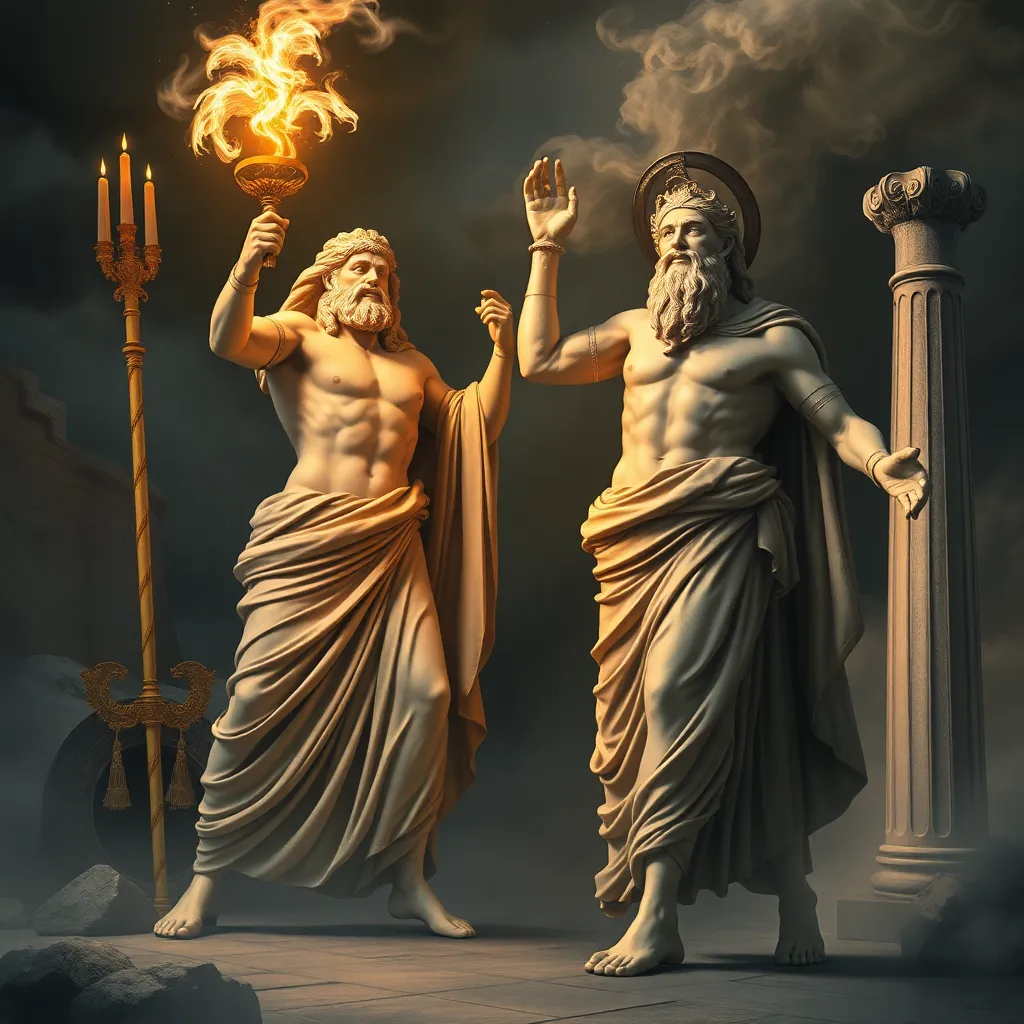Zeus and the Role of Fate in the Myths of Oedipus
I. Introduction
Greek mythology is a rich tapestry of stories that explore the complexities of human nature, the divine, and the universe. It has significantly influenced literature, art, and culture throughout history. Central to these myths is Zeus, the king of the gods, who embodies power, authority, and the enforcement of cosmic order.
In Greek mythology, fate is an inescapable force that dictates the course of events in both mortal and immortal lives. It is often depicted as a predetermined path that even the gods cannot alter. This article will explore how Zeus embodies and influences the themes of fate in the myths surrounding Oedipus, demonstrating the intricate interplay between divine power and human destiny.
II. The Nature of Zeus: King of the Gods
Zeus is characterized by several attributes and powers that underscore his status as the ruler of Mount Olympus and the divine authority over gods and mortals alike. Some of his key attributes include:
- God of the sky and thunder
- Protector of law and order
- Enforcer of justice
- Father of gods and men
As the arbiter of justice, Zeus plays a crucial role in maintaining order within the cosmos. He intervenes in mortal affairs, ensuring that balance is preserved. However, his relationship with fate is complex. While he holds immense power, he is often portrayed as being subject to the whims of the Moirai, the Fates, who weave the destinies of all beings.
III. The Concept of Fate in Greek Mythology
Fate, or moira, in Greek mythology refers to the unavoidable and predetermined course of events that dictate the lives of both mortals and gods. It is a central theme that underscores the belief in a higher power that governs the universe. The concept of fate is essential in distinguishing between what is meant to happen and what can be controlled. Key aspects include:
- Fate vs. Free Will: While fate suggests a predetermined path, free will allows individuals to make choices within that framework.
- The Moirai: The Fates are three goddesses who determine human destinies: Clotho (the spinner), Lachesis (the allotter), and Atropos (the unchangeable).
Zeus himself is often caught in the tension between exercising his divine authority and acknowledging the established order of fate. His role is less about altering fate and more about ensuring that it unfolds according to the divine plan.
IV. The Story of Oedipus: An Overview
The tale of Oedipus is one of the most compelling narratives in Greek mythology, encompassing themes of fate, free will, and tragic downfall. Oedipus, the son of Laius and Jocasta, was destined from birth to kill his father and marry his mother. Key events in his life include:
- Receiving the prophecy from the Oracle of Delphi.
- Fleeing his home to avoid fulfilling the prophecy.
- Unknowingly killing his father at a crossroads.
- Solving the riddle of the Sphinx and becoming the king of Thebes.
- Discovering the truth of his origins and the horrific fulfillment of the prophecy.
This tragic narrative highlights the powerful implications of fate in Oedipus’s life, leading him to a downfall that seems both inevitable and tragic.
V. Zeus’s Role in Oedipus’s Fate
Zeus’s influence is subtly woven into the fabric of Oedipus’s story, primarily through the prophecies that foreshadow his fate. While Zeus does not directly cause Oedipus’s misfortunes, his role as the king of the gods places him in a position of oversight regarding the unfolding of fate.
Divine intervention is a recurring theme in the myths of Oedipus, showcasing how the gods, including Zeus, play pivotal roles in shaping mortal destinies. The interplay between Zeus’s will and the inescapability of fate raises profound questions about agency and divine authority.
VI. The Clash Between Free Will and Predestination
Oedipus’s choices highlight the tension between free will and predestination. Despite his attempts to escape his fate, every decision he makes leads him closer to its fulfillment. This clash leads to several philosophical implications:
- Consequences of Choices: Oedipus’s actions, driven by a desire to avoid his fate, ironically result in its realization.
- Philosophical Reflection: The narrative raises questions about the nature of free will in a world governed by fate.
- Zeus’s Influence: The divine presence complicates the notion of personal agency, as even the mightiest hero cannot escape what has been decreed.
VII. The Aftermath: Lessons on Fate and Divine Authority
The consequences of Oedipus’s fate extend beyond his personal tragedy, affecting the city of Thebes. His downfall serves as a cautionary tale, illustrating the limits of human understanding and the dangers of hubris. Some reflections on this theme include:
- Consequences for Thebes: Oedipus’s actions lead to plague and suffering in his city, emphasizing the interconnectedness of fate.
- Moral Lessons: The myth reflects on the importance of humility and the recognition of one’s limitations in understanding the divine.
- Cautionary Tale: Oedipus’s journey serves as a reminder of the potential consequences of defying fate and the gods.
VIII. Conclusion
In conclusion, Zeus’s influence on the fate of Oedipus underscores the intricate relationship between divine power and human destiny in Greek mythology. The themes of fate and free will continue to resonate in literature and modern interpretations, reminding us of the enduring complexities of human existence. The stories of Oedipus and Zeus illustrate that while mortals may strive for control and understanding, the forces of fate and divine authority often remain beyond their reach.




